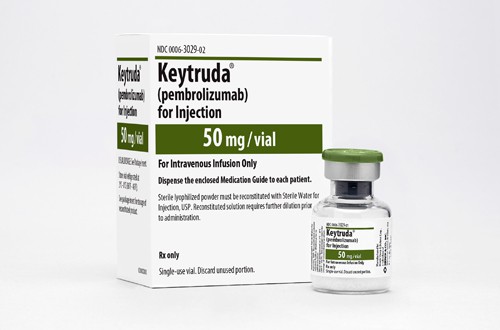
Merck & Co’s PD-1 inhibitor Keytruda has outperformed the world’s biggest-selling melanoma drug in a head-to-head trial.
The data coming out of the phase III study comparing Keytruda (pembrolizumab) with Bristol-Myers Squibb’s Yervoy (ipilimumab) was so compelling that it has been halted on the recommendation of an independent data monitoring committee.
The 834-patient KEYNOTE-006 trial compared Keytruda to Yervoy in patients with unresectable stage III or IV advanced melanoma with no more than one prior systemic therapy. Merck’s drug demonstrated significant and clinically meaningful improvements compared to Yervoy on both overall survival and progression-free survival – the two main outcome measures.
“Keytruda is the first anti-PD-1 therapy to demonstrate a survival advantage compared to the standard of care for the first-line treatment of advanced melanoma,” said Merck in a statement.
The results will be presented at the American Association of Cancer Research (AACR) annual meeting next month but provide further evidence of the impact PD-1 inhibitors such as Keytruda are starting to have in the oncology sector.
Merck‘s drug has already got off to a good start in the market – it brought in $50m in sales in the fourth quarter of 2014 following its approval in early-September in the US for melanoma – and the new data will consolidate its position as a melanoma therapy.
At the moment Keytruda is indicated or the treatment of patients with unresectable or metastatic melanoma and disease progression following Yervoy and – if BRAF V600 mutation positive – a BRAF inhibitor such as Roche’s Zelboraf (vemurafenib) and GlaxoSmithKline’s Tafinlar (dabrafenib).
The new data increase the chances of Keytruda moving to first-line use in melanoma and competing directly with Yervoy, which achieved sales of $1.3bn last year.
The PD-1 or checkpoint inhibitor class includes Opdivo (nivolumab) from BMS – approved for melanoma in December – as well as clinical-stage candidates from Roche, Merck KGaA/Pfizer and AstraZeneca (AZ).
As a whole the market for these drugs is expected to reach upwards of $15bn in peak annual sales thanks to widespread use across multiple cancer indications, with some analysts predicting twice that amount.
BMS is also trying to move Yervoy up the treatment chain – with trials ongoing as an adjuvant treatment for melanoma – and the drug is likely to find continued use in combination with other anticancer drugs, including Opdivo, Keytruda and other PD-1 inhibitors.
The company is also testing Yervoy as a single-agent therapy in prostate cancer, non-small-cell lung cancer (NSCLC) and small cell lung cancer, and in combination with Opdivo in melanoma, renal cell carcinoma and glioblastoma.




